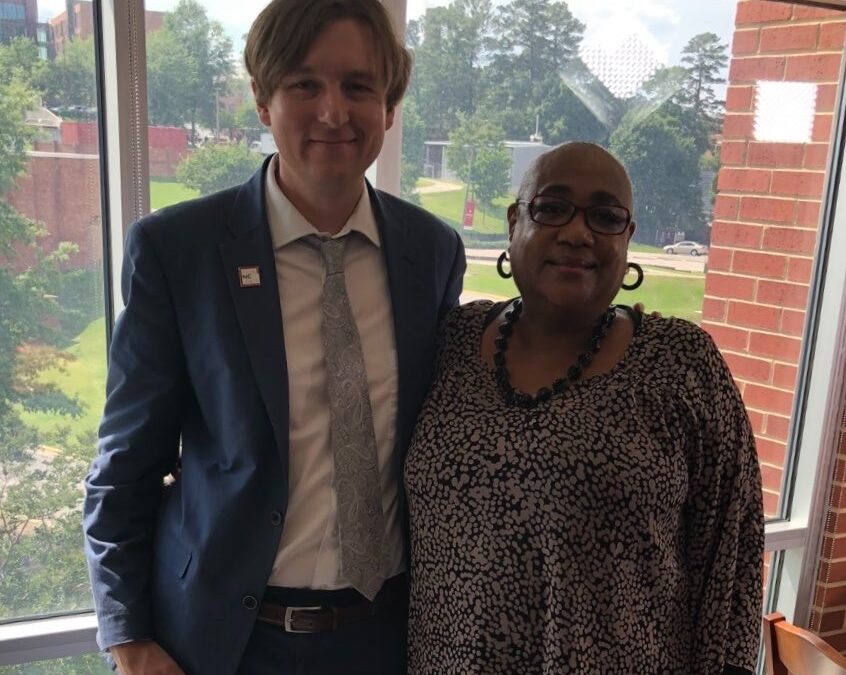Defendants to pay $125,000 to woman grabbed by her hair in traffic stop
A settlement has been reached in Bottom v. City of Salisbury, et al., a federal civil rights lawsuit brought by 70-year-old librarian Stephanie Bottom against law enforcement officers in Rowan County. The suit, filed in the U.S. District Court for the Middle District of North Carolina in 2021, sought compensation for the officers’ unlawful use of force, including the decision to pull Bottom from her vehicle by her hair, as well as for their search of her purse and vehicle, following a 2019 traffic stop for speeding. In exchange for dismissing all claims related to the traffic stop, the defendants agreed to pay Bottom $125,000. Emancipate NC Senior Counsel Ian Mance represented Bottom in partnership with the N.C. Central University School of Law Civil Litigation Clinic. Throughout the case, law students at N.C.C.U. assisted Ian and co-counsel C. Scott Holmes in their efforts.
Video of the traffic stop garnered considerable attention when it was first made available to the public, airing on Good Morning America and several national news broadcasts. Ms. Bottom and Ian appeared in the CNN documentary Traffic Stop: Dangerous Encounters, as well as on CBS This Morning. During the latter, host Gayle King, while reading Salisbury PD’s statement that it “strives for positive interactions with our residents and visitors,” remarked, “It’s hard to even say that with a straight face. I’m so angry and so saddened by what I just saw.”
Despite public outcry, Salisbury PD fought aggressively for more than two years to have the case dismissed, insisting their officers were entitled to qualified immunity. The department believed officers were justified in using force against Bottom because she did not heed their blue lights for approximately five minutes after they initiated the stop, prompting officers to disable her vehicle with spike strips. Bottom maintained she had not heard the officers’ sirens because she had been playing her music loudly, and she did not see their lights because she had been focused on the road and had not looked in her rearview mirror.
The City moved for summary judgment at the end of 2022, and Emancipate NC and NCCU filed their response a few weeks later. Last month, U.S. District Judge William L. Osteen, Jr., an appointee of President George W. Bush, issued a 58-page opinion, ruling substantially in Ms. Bottom’s favor. Among other things, Judge Osteen concluded that “Officer [Devin] Barkalow used excessive force”; “that it was unnecessary to forcefully pull an older woman from the vehicle by her hair onto the ground after providing her mere seconds to comply with orders to exit”; and that “Officer [Adam] Bouk’s search of Plaintiff’s purse and the map compartment of her vehicle violated her Fourth Amendment right to be free from unreasonable searches.” Bottom v. City of Salisbury, et al., slip op., at 21, 34, & 51 (M.D.N.C. Aug. 14, 2023). The decision prompted the City to seek a resumption in settlement negotiations, and the parties reached a resolution a few weeks later.
“Police officers cannot treat people the way they treated me,” said Ms. Bottom, who continues to work as a librarian in Atlanta. “If I was guilty for not stopping right away or speeding, it didn’t call for what you did to me. I have flashbacks from being pulled by my hair. The handcuffs injured my shoulder and I still feel the effects. I filed this lawsuit because I wanted the officers to recognize what they did was wrong. The judge’s ruling makes it clear they used excessive force and that the search was illegal. That’s what I’ve been fighting for. I’m happy to reach a settlement and have it resolved.”
Moving forward, Judge Osteen’s published opinion should help to clarify to officers in North Carolina that they have a responsibility during traffic stops to give people time to respond to orders to get out of their vehicle before laying hands on them. The Court found that although “the precise factual scenario has not been addressed by the Fourth Circuit or the Supreme Court,” Officer Barkalow had used “too much force too quickly” against Ms. Bottom, who “only had eight seconds to exit the vehicle from the time her door was opened and two seconds to exit her vehicle from the moment her seatbelt was unfasted.” Bottom, slip op., at 28 & 39.
As in a pair of recent cases Emancipate NC settled involving the aggressive, wrongful arrest of a teenager engaged in peaceful protest and the SWAT-style home raids of two innocent mothers, Bottom illustrates the alarming violence visited against Black women of all ages at the hands of North Carolina police officers. Emancipate NC has been honored to help our clients in these cases obtain more than half a million dollars in compensation from the agencies and officers who harmed them, and we hope these settlements demonstrate that there is a price to be paid for this kind of misconduct.
